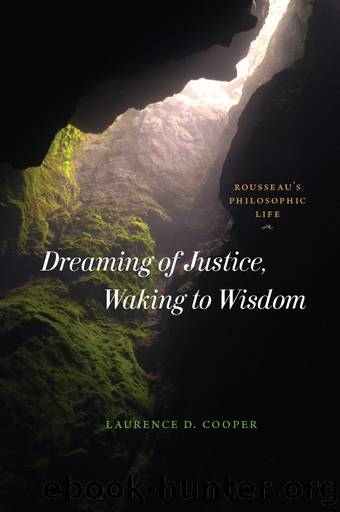Dreaming of Justice, Waking to Wisdom by Laurence D. Cooper

Author:Laurence D. Cooper [Cooper, Laurence D.]
Language: eng
Format: epub
Tags: PHI000000 PHILOSOPHY / General, PHI019000 PHILOSOPHY / Political, PHI046000 PHILOSOPHY / Individual Philosophers
Publisher: University of Chicago Press
Published: 2023-03-14T00:00:00+00:00
There is one more feature of the second subsection that weâd do well to examine before moving on. Rousseau says he had anticipated that a rigorous review of his opinions would lead to painful doubts. This seems believable enoughâexcept that he had previously been no stranger to doubt yet, as far as we can tell, had not suffered for it. Although he had reached age forty âwithout any principles determined by [his] reasonâ (6), âcarelessness and . . . peace of mind [had] always constituted [his] most dominant pleasure and most lasting propensityâ (7; emphasis added). Why should doubt and uncertainty begin to bother him now? Perhaps he only now came to see what was at stake; perhaps doubt incurred by philosophy is uniquely troubling. But perhaps Rousseau is also, or alternatively, saying something about a certain kind of philosophy.
It is in paragraphs 11 and 12 that Rousseau first reports that he was pained by doubt. He points an accusing finger: âThey had not persuaded me, but they had troubled me.â The they in question are modern philosophers, among whom he was then living: âInstead of removing my doubts and ending my irresolution, they had shaken all the certainty I thought I had concerning the things that were most important for me to knowâ (11). But the modern philosophers couldnât have taken away from Rousseau a certainty he hadnât had to begin with. What, then? My suggestion: they may have inspired in him a felt need for certainty that he hadnât theretofore felt. They may have taught him that he needed to know things that, until then, he had been satisfied merely to opine. They may have taught him that, concerning God and the soul, neither faith nor probabilistic reasoning can sufficeâand that neither faith nor probabilistic reason need suffice since rational certainty has been made possible by Descartes and the new philosophy he had launched. Now Descartes had not inculcated in human beings a need for certainty that hadnât previously been felt. But he had purported to show that certainty about God and the soul, the need for which had surely been deepened and intensified by Christianity, could be achieved by reason. The promise of certainty will in itself make uncertainty less tolerable. In this segment of the Third Walk, then, Rousseau presents a sort of symbolic telling, in the guise of a memoir, of the story of modern philosophy and its effects on humanity. Whether his doubts really made him suffer, and why, is finally unknowable. But we do knowâat any rate he shows usâthat his story took him far from where the modern philosophers would have had it go. Like the ancient philosophers whom he is so careful to distinguish from the moderns, Rousseau is a zetetic skeptic, neither claiming nor suffering for lack of Cartesian certainty.15
Download
This site does not store any files on its server. We only index and link to content provided by other sites. Please contact the content providers to delete copyright contents if any and email us, we'll remove relevant links or contents immediately.
The remains of the day by Kazuo Ishiguro(8969)
Tools of Titans by Timothy Ferriss(8365)
Giovanni's Room by James Baldwin(7325)
The Black Swan by Nassim Nicholas Taleb(7106)
Inner Engineering: A Yogi's Guide to Joy by Sadhguru(6785)
The Way of Zen by Alan W. Watts(6600)
Asking the Right Questions: A Guide to Critical Thinking by M. Neil Browne & Stuart M. Keeley(5757)
The Power of Now: A Guide to Spiritual Enlightenment by Eckhart Tolle(5749)
The Six Wives Of Henry VIII (WOMEN IN HISTORY) by Fraser Antonia(5496)
Astrophysics for People in a Hurry by Neil DeGrasse Tyson(5182)
Housekeeping by Marilynne Robinson(4436)
12 Rules for Life by Jordan B. Peterson(4299)
Double Down (Diary of a Wimpy Kid Book 11) by Jeff Kinney(4261)
Ikigai by Héctor García & Francesc Miralles(4246)
The Ethical Slut by Janet W. Hardy(4242)
Skin in the Game by Nassim Nicholas Taleb(4237)
The Art of Happiness by The Dalai Lama(4125)
Skin in the Game: Hidden Asymmetries in Daily Life by Nassim Nicholas Taleb(3988)
Walking by Henry David Thoreau(3952)
